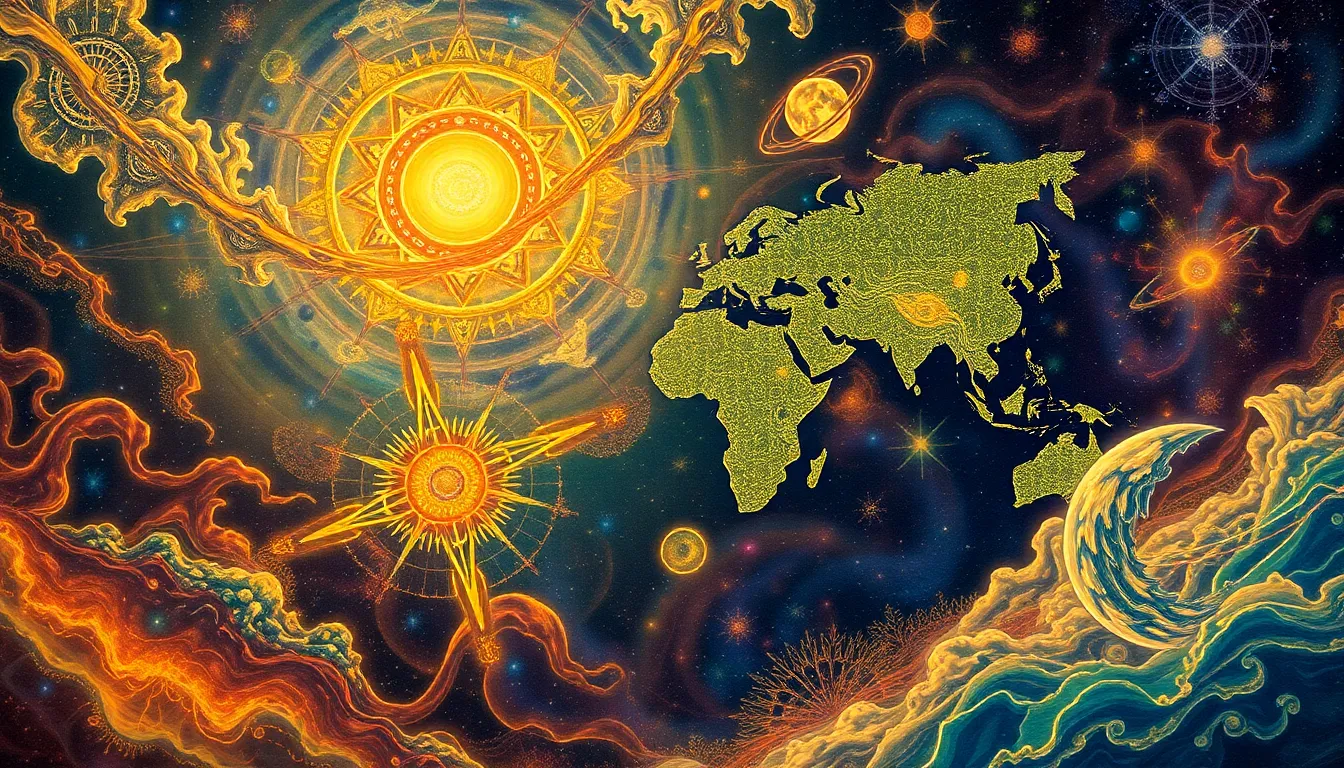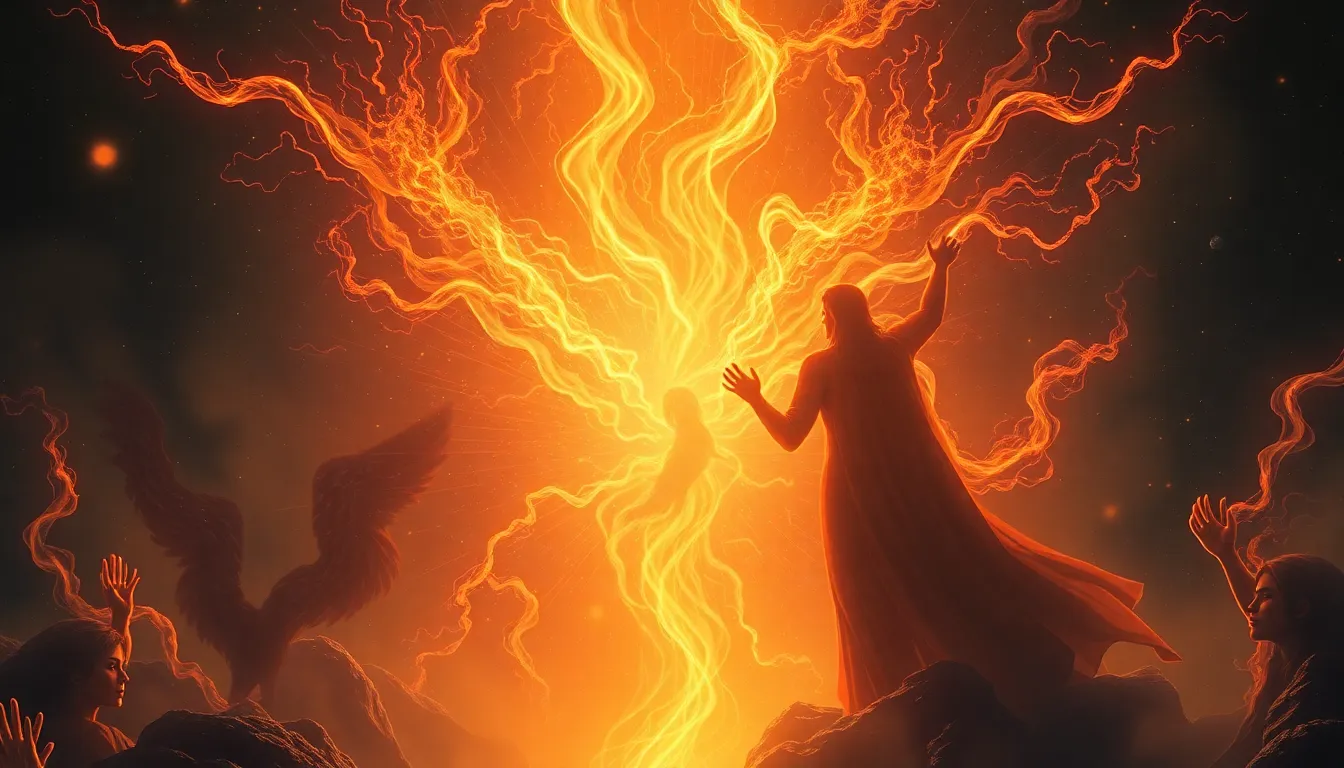The Cosmic Tapestry: Weaving Together Global Creation Myths
Introduction: Understanding Creation Myths
Creation myths are foundational narratives that explain the origins of the universe, humanity, and the natural world. These myths are significant across cultures as they reflect the values, beliefs, and understanding of the world by various societies. They serve as a lens through which we can view the spiritual and philosophical questions that have perplexed humanity since time immemorial.
This article aims to explore and compare global creation myths, highlighting their unique characteristics while identifying common themes that connect disparate cultures. Through this exploration, we will uncover the rich tapestry of human belief and creativity that these myths represent.
The Role of Creation Myths in Human Culture
Creation myths play a multifaceted role in human culture. They are not merely stories but serve various functions, including:
- Cultural Identity: Creation myths help to establish and reinforce the identity of a community, providing a shared narrative that binds individuals together.
- Spiritual Guidance: They offer spiritual insights and moral lessons, guiding people in their actions and beliefs.
- Philosophical Inquiry: These myths address essential existential questions such as the nature of existence, the purpose of life, and the origins of good and evil.
By addressing these profound questions, creation myths help individuals and societies navigate the complexities of life and their place within the universe.
The Elements of Creation: Common Themes Across Myths
Despite the diversity of creation myths around the world, several universal themes emerge:
- Chaos and Order: Many myths begin with a chaotic state of existence, from which order is created, often through the actions of divine beings.
- Divine Beings: The presence of gods, goddesses, or supernatural forces is a common feature, often tasked with the creation of the world or humanity.
- Emergence of Life: The narratives generally include the emergence of life, whether through the crafting of humans from clay, a divine breath, or spontaneous generation.
Furthermore, the elements of earth, water, fire, and air often play pivotal roles in these narratives, symbolizing the foundational aspects of life and existence.
Regional Spotlight: Creation Myths of Indigenous Peoples
Indigenous cultures around the world possess rich and varied creation myths that reflect their profound connection to nature. For example:
- Native American Myths: Many Native American stories illustrate the creation of the Earth from a primordial being or the emergence of humans from the earth itself, emphasizing harmony with nature.
- Aboriginal Australian Myths: The Dreamtime narratives recount the ancestral beings who shaped the land, animals, and people, highlighting the significance of land and spirituality in Aboriginal cultures.
These myths often encapsulate the relationship between humans and the natural world, suggesting a deep reverence for the environment and the interconnectedness of all life.
The Influence of Ancient Civilizations on Creation Myths
Creation myths from ancient civilizations such as Mesopotamia, Egypt, and Greece have profoundly influenced modern storytelling and religious thought. Key highlights include:
- Mesopotamia: The Enuma Elish describes the creation of the world through the conflict between gods, establishing a complex relationship between chaos and order.
- Egypt: The myth of Atum, who created the world from the primordial waters of Nun, showcases the significance of the Nile and the cyclical nature of life.
- Greece: Hesiod’s Theogony narrates the birth of the gods and the creation of humanity, illustrating the interplay between divine beings and human fate.
These myths reveal the interplay between mythology, religion, and societal structure, reflecting the values and beliefs of their cultures.
Creation Myths in Eastern Philosophies
Eastern philosophies present unique perspectives on creation, particularly in Hinduism, Buddhism, and Taoism:
- Hinduism: The cyclical nature of creation and destruction is exemplified in the concept of Brahma, Vishnu, and Shiva, representing creation, preservation, and destruction.
- Buddhism: While not focused on a creator deity, Buddhist cosmology reflects on the cyclic nature of existence and the idea of samsara.
- Taoism: The Tao Te Ching describes the universe’s creation as a spontaneous unfolding, emphasizing harmony with the natural flow of the cosmos.
This cyclical view contrasts with linear creation narratives in many Western traditions, offering a different understanding of existence.
The Impact of Abrahamic Traditions on Creation Narratives
Abrahamic traditions, including Judaism, Christianity, and Islam, share common creation narratives that emphasize a singular divine creator:
- Judaism: The Book of Genesis outlines the creation of the world in six days, culminating in the creation of humanity in the image of God.
- Christianity: The Genesis narrative is foundational, emphasizing themes of divine intervention and stewardship of creation.
- Islam: The Qur’an also contains creation stories that highlight God’s omnipotence and the purpose of humanity as vicegerents on Earth.
These narratives reflect themes of divine authority and the special status of humans in the created order.
Modern Interpretations and Adaptations of Creation Myths
In contemporary society, creation myths have been reinterpreted and adapted by authors, filmmakers, and artists. Notable examples include:
- Literature: Books like “American Gods” by Neil Gaiman blend traditional mythology with modern themes, exploring the relevance of ancient stories today.
- Film: Movies such as “Prometheus” delve into the origins of humanity, questioning the nature of creation and existence.
- Art: Visual artists often draw on creation myths to comment on societal issues and human experience.
The role of science fiction and fantasy has reshaped our understanding of creation, merging myth with imagination to explore new possibilities.
The Psychological and Sociological Perspectives on Creation Myths
Creation myths also carry psychological and sociological significance:
- Identity Formation: These myths can shape individual and collective identities, providing a sense of belonging and purpose.
- Social Cohesion: Shared narratives foster community bonds, but differing myths can also lead to conflict and division.
Understanding these dynamics can illuminate how myths influence contemporary social structures and relationships.
Conclusion: The Enduring Legacy of Creation Myths
In conclusion, creation myths are an essential part of the human experience, offering insights into our origins, beliefs, and values. They are not only fascinating stories but also serve to connect us across cultures and time periods. Preserving and understanding these diverse narratives is crucial in today’s globalized world, where they have the potential to inspire unity and celebrate diversity. As we continue to explore and reinterpret these myths, we honor the rich tapestry of human thought and creativity.




